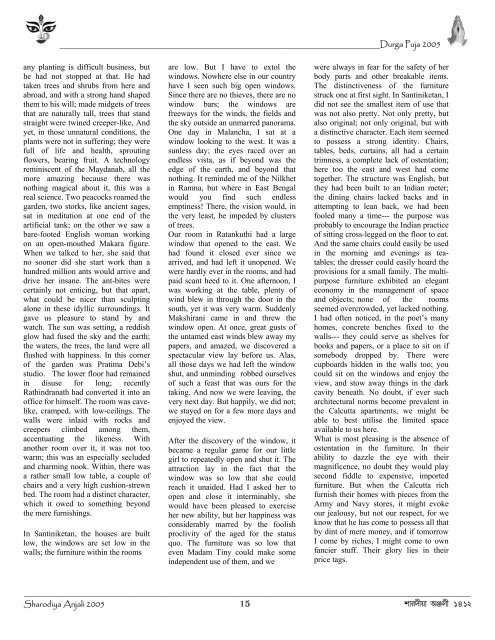Sharodiya Anjali 2005 - Pujari
Sharodiya Anjali 2005 - Pujari
Sharodiya Anjali 2005 - Pujari
Create successful ePaper yourself
Turn your PDF publications into a flip-book with our unique Google optimized e-Paper software.
__________________________________________________________________Durga Puja <strong>2005</strong><br />
any planting is difficult business, but<br />
he had not stopped at that. He had<br />
taken trees and shrubs from here and<br />
abroad, and with a strong hand shaped<br />
them to his will; made midgets of trees<br />
that are naturally tall, trees that stand<br />
straight were twined creeper-like, And<br />
yet, in those unnatural conditions, the<br />
plants were not in suffering; they were<br />
full of life and health, sprouting<br />
flowers, bearing fruit. A technology<br />
reminiscent of the Maydanab, all the<br />
more amazing because there was<br />
nothing magical about it, this was a<br />
real science. Two peacocks roamed the<br />
garden, two storks, like ancient sages,<br />
sat in meditation at one end of the<br />
artificial tank; on the other we saw a<br />
bare-footed English woman working<br />
on an open-mouthed Makara figure.<br />
When we talked to her, she said that<br />
no sooner did she start work than a<br />
hundred million ants would arrive and<br />
drive her insane. The ant-bites were<br />
certainly not enticing, but that apart,<br />
what could be nicer than sculpting<br />
alone in these idyllic surroundings. It<br />
gave us pleasure to stand by and<br />
watch. The sun was setting, a reddish<br />
glow had fused the sky and the earth;<br />
the waters, the trees, the land were all<br />
flushed with happiness. In this corner<br />
of the garden was Pratima Debi’s<br />
studio. The lower floor had remained<br />
in disuse for long; recently<br />
Rathindranath had converted it into an<br />
office for himself. The room was cavelike,<br />
cramped, with low-ceilings. The<br />
walls were inlaid with rocks and<br />
creepers climbed among them,<br />
accentuating the likeness. With<br />
another room over it, it was not too<br />
warm; this was an especially secluded<br />
and charming nook. Within, there was<br />
a rather small low table, a couple of<br />
chairs and a very high cushion-strewn<br />
bed. The room had a distinct character,<br />
which it owed to something beyond<br />
the mere furnishings.<br />
In Santiniketan, the houses are built<br />
low, the windows are set low in the<br />
walls; the furniture within the rooms<br />
are low. But I have to extol the<br />
windows. Nowhere else in our country<br />
have I seen such big open windows.<br />
Since there are no thieves, there are no<br />
window bars; the windows are<br />
freeways for the winds, the fields and<br />
the sky outside an unmarred panorama.<br />
One day in Malancha, I sat at a<br />
window looking to the west. It was a<br />
sunless day; the eyes raced over an<br />
endless vista, as if beyond was the<br />
edge of the earth, and beyond that<br />
nothing. It reminded me of the Nilkhet<br />
in Ramna, but where in East Bengal<br />
would you find such endless<br />
emptiness! There, the vision would, in<br />
the very least, be impeded by clusters<br />
of trees.<br />
Our room in Ratankuthi had a large<br />
window that opened to the east. We<br />
had found it closed ever since we<br />
arrived, and had left it unopened. We<br />
were hardly ever in the rooms, and had<br />
paid scant heed to it. One afternoon, I<br />
was working at the table, plenty of<br />
wind blew in through the door in the<br />
south, yet it was very warm. Suddenly<br />
Makshirani came in and threw the<br />
window open. At once, great gusts of<br />
the untamed east winds blew away my<br />
papers, and amazed, we discovered a<br />
spectacular view lay before us. Alas,<br />
all those days we had left the window<br />
shut, and unminding robbed ourselves<br />
of such a feast that was ours for the<br />
taking. And now we were leaving, the<br />
very next day. But happily, we did not;<br />
we stayed on for a few more days and<br />
enjoyed the view.<br />
After the discovery of the window, it<br />
became a regular game for our little<br />
girl to repeatedly open and shut it. The<br />
attraction lay in the fact that the<br />
window was so low that she could<br />
reach it unaided. Had I asked her to<br />
open and close it interminably, she<br />
would have been pleased to exercise<br />
her new ability, but her happiness was<br />
considerably marred by the foolish<br />
proclivity of the aged for the status<br />
quo. The furniture was so low that<br />
even Madam Tiny could make some<br />
independent use of them, and we<br />
were always in fear for the safety of her<br />
body parts and other breakable items.<br />
The distinctiveness of the furniture<br />
struck one at first sight. In Santiniketan, I<br />
did not see the smallest item of use that<br />
was not also pretty. Not only pretty, but<br />
also original; not only original, but with<br />
a distinctive character. Each item seemed<br />
to possess a strong identity. Chairs,<br />
tables, beds, curtains, all had a certain<br />
trimness, a complete lack of ostentation;<br />
here too the east and west had come<br />
together. The structure was English, but<br />
they had been built to an Indian meter;<br />
the dining chairs lacked backs and in<br />
attempting to lean back, we had been<br />
fooled many a time--- the purpose was<br />
probably to encourage the Indian practice<br />
of sitting cross-legged on the floor to eat.<br />
And the same chairs could easily be used<br />
in the morning and evenings as teatables;<br />
the dresser could easily hoard the<br />
provisions for a small family. The multipurpose<br />
furniture exhibited an elegant<br />
economy in the management of space<br />
and objects; none of the rooms<br />
seemed overcrowded, yet lacked nothing.<br />
I had often noticed, in the poet’s many<br />
homes, concrete benches fixed to the<br />
walls--- they could serve as shelves for<br />
books and papers, or a place to sit on if<br />
somebody dropped by. There were<br />
cupboards hidden in the walls too; you<br />
could sit on the windows and enjoy the<br />
view, and stow away things in the dark<br />
cavity beneath. No doubt, if ever such<br />
architectural norms become prevalent in<br />
the Calcutta apartments, we might be<br />
able to best utilise the limited space<br />
available to us here.<br />
What is most pleasing is the absence of<br />
ostentation in the furniture. In their<br />
ability to dazzle the eye with their<br />
magnificence, no doubt they would play<br />
second fiddle to expensive, imported<br />
furniture. But when the Calcutta rich<br />
furnish their homes with pieces from the<br />
Army and Navy stores, it might evoke<br />
our jealousy, but not our respect, for we<br />
know that he has come to possess all that<br />
by dint of mere money, and if tomorrow<br />
I come by riches, I might come to own<br />
fancier stuff. Their glory lies in their<br />
price tags.<br />
____________________________________________________________________________________________<br />
<strong>Sharodiya</strong> <strong>Anjali</strong> <strong>2005</strong> 15 n¡lc£u¡ A”m£ 1412




